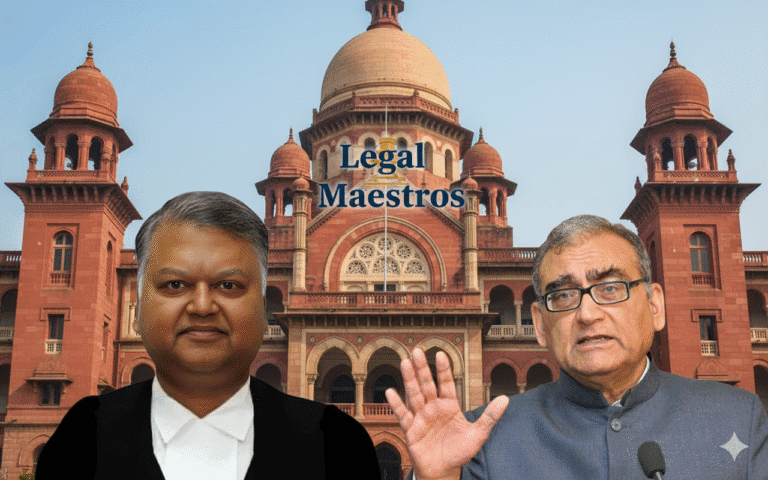
Contract
By – Sneha Vyas
INTRODUCTION
As humans, we often make mistakes in our lives, but have you ever wondered what would happen if, under such mistaken belief or coercion, we delivered something to someone we were not legally bound to deliver? Let’s suppose an authority imposed a penalty on you, and since you were not aware of the law, you deposited the amount of the penalty to that authority, but later, after some research, you learned that the authority had no power to impose such a penalty on you, or let’s say the authority had no jurisdiction over the matter. Now, the question is, can you ask them to repay the money? The answer is Yes. Section 72 of the Contract Act[1] Imposes the legal responsibility on such individuals to repay or return the money or thing delivered, by mistake or under coercion. This liability is imposed because of a concept in contract law labelled as Unjust Enrichment. This principle, in the simplest manner, can be understood as that a person shall not unjustly derive benefit because of someone else’s mistaken belief. Let’s understand the scope, application, and interpretation of this section while exploring crucial landmark precedents.
SECTION 72; CONTRACT ACT, 1872
For any queries or to publish an article or post or advertisement on our platform, do call at +91 6377460764 or email us at contact@legalmaestros.com.
The section explains about: – “Liability of the person to whom money is paid, or thing delivered, under coercion or by mistake, a person to whom money is paid, or anything delivered, under coercion or by mistake, must pay it back or return it”.[2] The aforementioned is hereby stated that it is the liability of the person who is receiving the money or thing under coercion or mistake to pay back that money or restore the thing delivered. This section helps prevent unjust enrichment in transactions.
MEANING OF MISTAKE UNDER SECTION 72
The mistake is an error, misconception, or misunderstanding, or an erroneous belief as defined under Black’s Law Dictionary. It is an established principle that the money paid under coercion or mistake of fact is restored. However, the dilemma begins when the money is paid under the mistaken belief of the law. The maxim ‘Ignorantia juris non excusat’, which means ignorance of the law is not excusable. This is one of the most basic and cardinal principles of jurisprudence and law[3]. However, it does not apply to this section. Mistake of law is not excluded under this section. Therefore, the money paid by mistake, both under the mistake of law or mistake of fact, can be recovered if the money was not due by an enforceable contract or otherwise[4]. As Harries C.J. opined, “There is no dilemma in English Law, money paid by mistake of fact is recoverable, but in general money paid by mistake of law cannot be recoverable”[5]. After the Privy Council Judgment in Sri Sri Shiba Prasad Singh v Maharaja Srish Chandra Nandi, the position of Indian law was clarified by certifying that the money which is paid under mistake can be restored, even when the mistake is in respect of law[6].
For any queries or to publish an article or post or advertisement on our platform, do call at +91 6377460764 or email us at contact@legalmaestros.com.
THE MISTAKE OF LAW AND THE MISTAKE OF FACT
When a person misinterprets a fact or a situation, this is known as a mistake concerning fact. For example, “Amit and Abhay owe 500 rupees to Shivam jointly. Amit himself pays the amount to Shivam, and Abhay, unaware of this fact, pays 500 rupees again to Shivam. Shivam is bound to restore the money to Abhay”.[7]
When a person misinterprets or is ignorant of the law, it constitutes a mistake regarding the law. For example, A development authority imposed a penalty on a company for not obtaining the necessary permission for the plan of a factory. The company, ignorant of the law, deposited the penalty and later discovered that the development authority had no jurisdiction to approve or reject the plans of factories. The development authority is bound to repay the amount deposited by the company under a mistake concerning the law.
For any queries or to publish an article or post or advertisement on our platform, do call at +91 6377460764 or email us at contact@legalmaestros.com.
WHAT IS UNJUST ENRICHMENT AND RESTITUTION?
Unjust Enrichment refers to preventing anyone from gaining an unjust benefit at the expense of another person. It clarifies that a person shall not keep an unjust benefit and must repay or compensate the amount. Restitution is the act of returning or compensating for a benefit or gain. Section 72 of the Indian Contract Act, 1872, is based on this principle, which is why it permits the recovery of money or anything given under mistake or coercion.
DIFFERENCE BETWEEN MISTAKE UNDER SECTION 20, 21, 22, AND 72
For any queries or to publish an article or post or advertisement on our platform, do call at +91 6377460764 or email us at contact@legalmaestros.com.
The Mistake of Law and the Mistake of Fact determine, enforceability of a contract under sections 20, 21, and 22. “Under section 20, when both parties are mistaken regarding an essential fact which is of prime importance for the agreement, then the agreement will be void.”[8], section 21 says that “if the parties enter into a contract by mistake in respect of any Indian law, then it cannot be said to be voidable nevertheless if mistake occurs in respect of any law but not an Indian law in force i.e., foreign or international law then such contract can be treated as in the same position as the contract entered under mistake concerning fact.”[9]. It means that if any contract is caused by a mistake concerning law, to be specific, the ‘Indian law’, then such a mistake cannot be excused and the contract would not be rendered voidable on this ground. ”Section 22 simply explains that a contract will not be voidable at the option of one party for the sole reason that while entering into it, one of the parties to it was under a mistake in respect of an essential fact.”[10]. In conclusion, a contract cannot be rendered voidable only because of a mistake as to law; however, it is said to be void in case each of the parties is mistaken regarding a fact significant for the agreement, as explained under sections 20,21,22. These sections differ from section 72 in a way that “even if the money is paid in mistake as to fact or a mistake concerning the law, it can be restored by the aid of this section.”[11]. This section doesn’t differentiate between a mistake as to law and fact. “The money paid by mistake can be restored if it was not due under any contract or otherwise.”[12].
JUDICIAL INTERPRETATION
The Hon’ble Apex Court, in a case, “has upheld that the money paid “by mistake” under section 72 must be the money paid, which is not pending and which cannot be legally enforced. A “mistake” occurs when a person thinks that the payment made was due, but, in actuality, that payment was not pending. If the contracting parties enter a contract by or under some misinterpretation or ignorance of the law, then such a contract is legally binding on the parties. Nevertheless, if either of the parties, under the mistaken belief of law, makes a payment of a sum of money to the other party to the contract and if that money was not payable under any contract or any other law, the payer has the right to recover it. The Apex Court ruled that the simple terms of the section shall be taken into consideration, as drafted by the Parliament. The position of law, as in England or any other jurisdiction, cannot be resorted to in Indian Courts if the language of the section is plain and unambiguous.”[13]
For any queries or to publish an article or post or advertisement on our platform, do call at +91 6377460764 or email us at contact@legalmaestros.com.
CONCLUSION
Section 72 plays a vital role in protecting individuals’ rights in this era of digital and automated payments. It prevents a person from taking unjust advantage of the mistakes of others. Principles of restitution and unjust enrichment help an individual to recover their sum of money which is paid by mistake. The clear and plain language of this provision does not create any differentiation among the mistakes. Unless the money is due under a contract or otherwise, the money paid or thing delivered under mistake can be recovered, as upheld in the Apex Court rulings. The mistake regarding law cannot be said to make a contract voidable; however, the sum of money paid by a mistake as to law can be restored. It binds the person to act ethically while dealing in financial, business, or personal transactions.
Author Bio – My name is Sneha Vyas, born and brought up in Chittorgarh, Rajasthan. I am a final year (5th year) student pursuing BBA LLB (Hons.) Specialization in Corporate from JECRC University, Jaipur. I have keen interest in Corporate and business law. I am passionate about legal research and writing, aiming to contribute to the evolving field of corporate law.
For any queries or to publish an article or post or advertisement on our platform, do call at +91 6377460764 or email us at contact@legalmaestros.com.
[1] The Indian Contract Act 1872, s 72
[2] Ibid
[3] Parvani Marwah, ‘IGNORANCE OF LAW IS NO EXCUSE’ (Indian Legal Wing, 19 August 2021) <https://www.indianlegalwing.com/post/ignorance-of-law-is-no-excuse> accessed 18 March 18 2025
For any queries or to publish an article or post or advertisement on our platform, do call at +91 6377460764 or email us at contact@legalmaestros.com.
[4] Sri Sri Shiba Prasad Singh v Maharaja Srish Chandra Nandi (1949) AIR PC 297
[5] Ibid
[6] Avtar Singh’s, Contract & Specific Relief (first published 1973, 13th edn, Eastern Book Company 2022)
For any queries or to publish an article or post or advertisement on our platform, do call at +91 6377460764 or email us at contact@legalmaestros.com.
[7] The Indian Contract Act 1872, s 72
[8] The Indian Contract Act 1872, s 20
[9] The Indian Contract Act 1872, s 21
For any queries or to publish an article or post or advertisement on our platform, do call at +91 6377460764 or email us at contact@legalmaestros.com.
[10] The Indian Contract Act 1872, s 22
[11] Sri Sri Shiba Prasad Singh v Maharaja Srish Chandra Nandi (1949) 1949 AIR PC 297
[12] Ibid
For any queries or to publish an article or post or advertisement on our platform, do call at +91 6377460764 or email us at contact@legalmaestros.com.
[13] Sales Tax officer, Banaras & Ors v Kanhaiya Lal Mukund Lal Saraf (1958) 1959 AIR 135





![JOB POST: Junior Associate at ASM Law Chambers, Jaipur [Freshers]](https://legalmaestros.com/wp-content/uploads/2025/11/Gemini_Generated_Image_8wrxer8wrxer8wrx-768x708.png)

